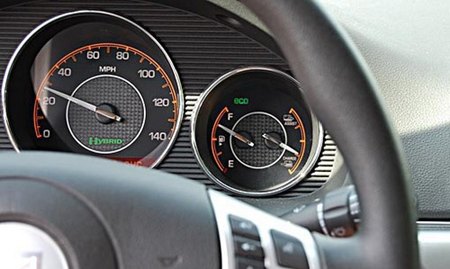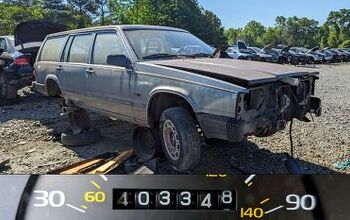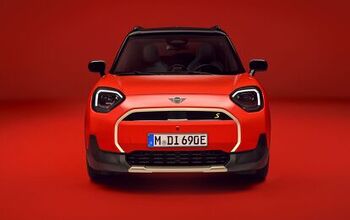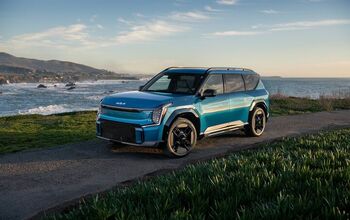Is the Hybrid Boom About to Go Bust?
According to mlive.com, auto industry analysts predict that the hybrid “premium” and consumer acceptance of $3 a gallon gas will dampen near-term demand for gas – electric vehicles. J.D. Power and Associates senior manager Michael Omotoso says the arrival of the next gen Prius will revive the genre. "In 2009 we see hybrid sales going over 600,000 units." Over at AutoNation, some 70 percent of car shoppers inquire about hybrids– but only two percent end up buying one. Spokesman Marc Cannon claims the Prius has been successful because "Americans really like that fact that the Prius stands out and it's a social statement; if you have a Prius, everyone knows it's a hybrid." And what of battery-powered cars? "The lithium-ion battery is nowhere near ready for showtime," says Brett Smith, a hybrid analyst at the Center for Automotive Research. Still, the Volt hype has raised expectations– and how. "Whoever sees those concept cars thinks it's ready to go." As Albert Einstein said, “Reality is merely an illusion, albeit a very persistent one."
Glenn is a baby-boomer, born in 1954. Along with his wife, he makes his home in Connecticut. Employed in the public sector as an Information Tedchnology Specialist, Glenn has long been a car fan. Past rides have included heavy iron such as a 1967 GTO, to a V8 T-Bird. In between those high-horsepower cars, he's owned a pair of BMW 320i's. Now, with a daily commute of 40 miles, his concession to MPG dictates the ownership of a 2006 Honda Civic coupe which, while fun to drive, is a modest car for a pistonhead. As an avid reader, Glenn enjoys TTAC, along with many other auto-realated sites, and the occasional good book. As an avid electronic junkie, Glenn holds an Advanced Class amateur ("ham") radio license, and is into many things electronic. From a satellite radio and portable GPS unit in the cars, to a modest home theater system and radio-intercom in his home, if it's run by the movement of electrons, he's interested. :-)
More by Glenn Swanson


































Comments
Join the conversation
Lumbergh21 said: I’ll stick by the assertion that it is a political/social statement not an economic decision that drives people to buy hybrids. Not me. Ghillie responded: Well, I’ve read numerous posts on this site by people saying buying a Prius was an economic decison for them…. so, obviously, you’re wrong if you mean that statement to apply to everyone. No doubt there are many people who buy hybrids (especially a Prius) to make a statement - but what proportion of the total is just a guess, probably based on the prejudices of the person making the guess rather than any “facts”. Right on. Furthermore, it is a big mistake to assume that people who drive hybrids are of one particular political view or party, or that people who drive a hybrid automatically buy into the global warming religion. Yet many people continue to make this superficial mistake every day. By the way, I thought that the Insight was a great little car. Problems, however... 1. I couldn't get a test drive without putting money down at a dealer and placing an order. What's up with that? 2. The red and silver colors were nice, and later a blue one came out, but that bile-green was nasty, like yesterday's chip-dip... 3. Honda's IMA hybrid system did not allow for the gas engine to shut off at traffic lights when running the AC. I live in Florida; nuff said. 4. The Insight wasn't available as a top-down roadster. 5. Honda no longer makes the Insight.
Whether or not these people believe that the Prius saves them money doesn't change the hard numbers. I'll admit the calculations I included in my first post are quick and dirty and don't take into account the resale value of the respective cars or the time value of money, only estimated gasoline price inflation (and a rather high estimate at that)and a modest return on investment after taxes. However, anyone who plans on keeping a hybrid for 200,000+ miles before reselling it, shouldn't expect much residual value. Maybe others won't consider this, but the constant cycling of those batteries over those 200,000+ miles has got to have a serious effect on their current ability to store energy. I would look at buying an old hybrid the same as buying an old conventional car that was in need of a new engine since the cost of a new battery pack is as much or more than the cost of a rebuilt engine. Then you also have the fact that you have an old engine in their as well as all other systems, just like a conventional car. These issues should certainly effect the resale value of an old hybrid, and by the tiem you have paid for the extra purchase cost through gas savings, that is exactly what you will have, an old hybrid. My point being that the cost of gas even at extremely high prices, $5+, is still small compared to the initial capital outlay in buying a car. If you buy a hybrid that gets 50% better gas mileage than a comparable conventionally driven car, you are still only saving a few hundred dollars each year. That might make you feel good, but it doesn't make up for the intial additional capital outlay of several thousand dollars for quite some time; quite posssibly not even within the life time of the car.